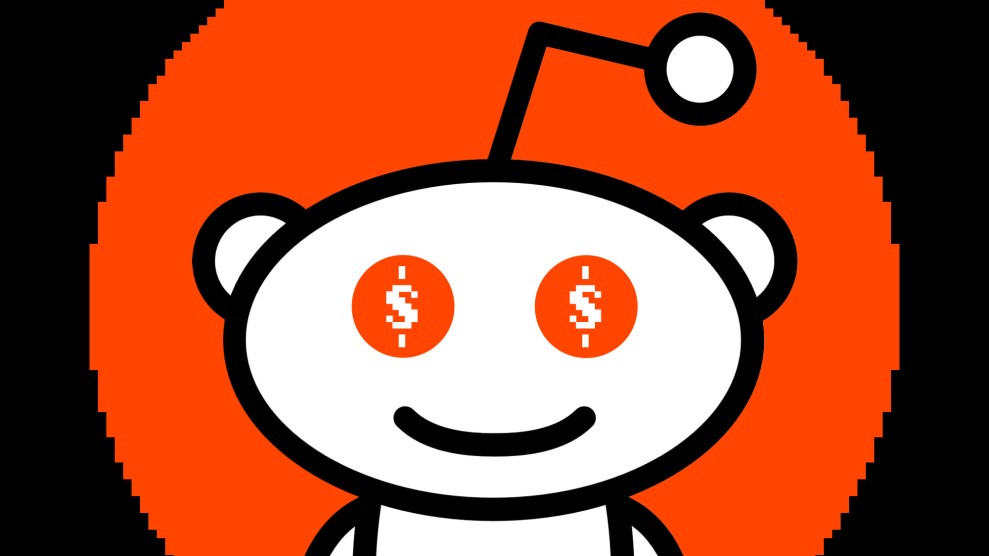
Mother Jones illustration
Thousands of Reddit communities went dark this week to protest the webforum giant’s money-making plans. Ahead of an expected IPO later this year, the company’s CEO announced it would start charging for access to its application programming interface.
APIs are a common feature of web platforms, essentially letting anyone peer more deeply under the hood. They are often harnessed by ancillary apps that provide users other ways or spaces to interact with a platform’s offerings. Reddit executives’ defense of the move sounds reasonable, especially now: Companies like OpenAI and Google are reportedly inhaling value from Reddit, putting the content it hosts in their artificial intelligence training data sets without compensating the company.
But if it were to charge large fees for access to this information via its API, Reddit would shut out the enthusiasts who have made their own smaller, but widely beloved, third-party alternative Reddit apps like Apollo and Reddit is Fun.
It’s rare for users to coordinate to fight back against such market-driven changes at a platform, but the broad strokes of what Reddit is doing—clawing back value from users to give to shareholders—are commonplace. It happens so frequently that writer Cory Doctorow has coined a term for the process, calling it “the enshittification” of tech platforms. He defined it in a January post on his blog:
Here is how platforms die: first, they are good to their users; then they abuse their users to make things better for their business customers; finally, they abuse those business customers to claw back all the value for themselves. Then, they die.
In their beginning phases, Doctorow elaborates, new platforms need users. So they create a situation that’s advantageous for them. He recalls how Amazon initially offered cheap, accessible products, but, as competitors were swept aside or died, Doctorow says the company entered a less user-beneficial, but presumably more profitable, phase, as it made it harder for customers to find the best products by prioritizing sellers who paid Amazon the most for ads.
You can see the same trend at Facebook, where its feed went from being a useful tool to keep tabs on people around you, to a slightly less useful tool boosting the content of business that the company wanted on the platform, to a chamber of emotional incitement designed to maximize user engagement. At Uber, after subsuming the taxi industry, trips became more expensive and paid out less to drivers. Doctorow says TikTok’s enshittification, as it transitions from a social media upstart to a hegemon, can be seen in its shift from making recommendations solely based on user interests, to “heating” or artificially boosting the content of big creators it wants to work with.
Even subscription services that users directly pay for are not safe. When a company runs out of ways to grow its subscriber base, it can turn inward and devise methods to extract more from those already paying. Last month, for example, Netflix announced that it would end long-tolerated password sharing between users in different households as it attempts to squeeze viewers.
When such things take place, it can feel like users are no longer the consumer of the product—they are now being consumed by the product. This was always true with the data tech companies hoovered up, but has become more pronounced as they look for new revenue streams.
Enshittification and adjacent behavior isn’t just a tech-specific phenomenon; it’s increasingly moving into other parts of our lives where transactions take place. Car companies like BMW, Cadillac, and Mercedes have been moving down that road, as they introduce subscriptions for heated seats, automatically dimming high beams, improved cruise control, and increased acceleration, respectively, to activate features that are in a car you already paid for. Airlines have been doing it for years, charging for more—and more for—amenities that were once free, while physically squeezing passengers in tighter rows and smaller seats.
These are all just variations of the same goal: extracting more money from mostly middle- and lower-class members of the public and redirecting it to the ballooning compensation packages of vice presidents, C-suite executives, and the shareholders they answer to. You might call it corporate wealth redistribution.
On Wednesday, Motherboard’s Jason Koebler published an impassioned essay describing the battle over Reddit’s API as a “battle for the soul of the internet.” Indeed, Reddit is an important and influential site and is one of the few major holdouts of a more people-to-people oriented Internet era, before Silicon Valley venture capitalists really got down to strip-mining everything online of value. As Koebler writes, “this may be one of our last chances to preserve an actually popular, useful website that is largely governed by its community.” He’s right.
But regardless of which way this battle for the soul of the internet goes, the war has probably already been hashed out. Even if Reddit’s protesting users win, their victory isn’t likely to last. In time, the company’s shareholders will learn to care less about user backlash, or new ones who have priced it in will step up. Until that day, Reddit will be a small holdout surrounded by behemoths who have already given themselves up to the path of enshittification. It would just be like one of those homeowners you hear about who refuses to sell as their lot is swallowed up and surrounded by a massive development. Those people don’t lose their houses—but they don’t win either.
















